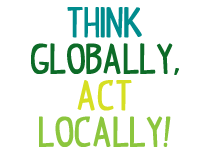Nowadays globalisation became part of our everyday lives. However we want to be less aware, try not to see that the world around us is changing on a fast track. Unfortunately this change also has negative effects. Our project aims to give guidance for the new generation to better understand how globalisation affects their lives, what kind of interactions are in place on one hand amongst politics, the environment, the society, the culture, the dimensions of economy and on the other hand the different social groups and global regions. Global education is teaching us to have a better overview over complex processes and critical thinking. At the same time it is committed to the values of social justice and active citizenship. It aims to raise not only a thinking youth but also a youth that is able and eager to take actions to create a fairer and more sustainable world.
The concept of global education appeared just recently in public thinking and its progression to put it in practice is slow. Most of the times it turns up in the education through a cooperation between schools and non-governmental organisations, but most of the times mainly informal teaching methods are used that can be only applied to a limited degree in a formal class framework. Although the teachers believe that the sensitisation of the students to global issues is important, they often complain that they are lack of means to integrate the topic into the regular class schedule. The project aims to fill in this gap with the first Hungarian pedagogical material that accomplishes global education within the frames of the conventional subjects.
Global Fairness: Global Learning at School
It is a sad reality that the economic, environmental and social disparities between the global South and the global North are constantly increasing. People in the global North must recognize how their own lifestyles and consumer behaviour fundamentally affect developing countries and what they can do to tackle these inequalities.
The project “Global Fairness” addresses this issue and initiates it in a place where people prepare for life – at schools. This is where our “Agents for Change” can also be found. “Global Fairness” is the successor project of “Awareness for Fairness“ – its innovative development. The main topics related to “Global Fairness” are to be integrated in the classroom, in the curriculum, in educational opportunities and in everyday classes. The project is therefore aimed at school actors – in particular at managers, teachers and students, as well as school administrations.
We expect “Global Fairness“ to have a variety of effects on schools in the area of global learning. These include, among other things, the integration of global issues in the curriculum and school programmes, improved competencies of teachers and increased commitment from children and youths as “Agents for Change”. Schools can obtain certification as a Fair School and thus sustainably integrate global fairness in the school profile.
In the long term, awareness for global fairness is to be strengthened and changes in consumer behaviour initiated. The project will provide a variety of materials for use in lessons – manuals for teachers as well as study materials for the students, exhibitions or a “Global Classroom”. The project’s particular benefit for Berlin is the strengthening of the international networking of schools in Berlin and the accompanying NGOs, as well as support in the implementation of the new curricula requirements for the learning sector global development in Berlin schools.
Goal of the Hungarian project
To establish a network of 4 Hungarian schools participating in the development, testing and integration into the conventional syllabus of a pedagogical material (curriculum material package) that reflects the topics, philosophy and approach of global education. With that the participating schools become part of a pioneer initiative that integrates global education into the formal teaching methods. As a result the schools can become more attractive for students and parents. Later the initiative can guide the way also for other schools.
